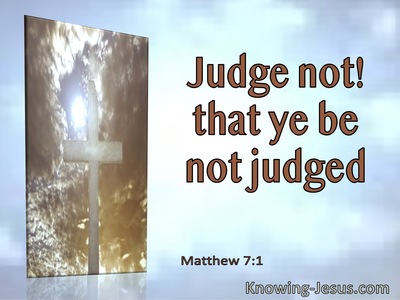

Avoid criticizing others or dwelling on their faults.

Give them the benefit of the doubt as much as you can. Some cite Matthew 7:1 as proof that we should do no judging whatsoever: Judge not, that you be not judged. From the King James Bible of Matthew 7: 1-3. Clearly the commandment, “Judge not” doesn’t mean, “Don’t make decisions,” or even “Don’t make decisions involving other people.” Instead, I think it means, “Don’t be harsh in your assessments of other people. judge not, that you be not judged judge not, lest ye be judged Etymology. I think that the key is the attitude we bring to those decisions. Who can I trust to fulfill specific assignments at work? Who should I hire to do yard work, to service my car, to babysit my children? The list goes on. When I think about my daily decisions, I recognize that many of them rely on some assessment of other people. Ye shall know them by their fruits” ( verses 15-16). “Beware of false prophets, who come to you in sheep’s clothing, but inwardly they are ravening wolves.They, as really in the van of the religious progress of mankind, took on themselves to judge other nations. “Give not that which is holy unto the dogs, neither cast ye your pearls before swine, lest they trample them under their feet, and turn again and rend you” ( verse 6). The words point to a tendency inherent in human nature, and are therefore universally applicable but they had, we must remember, a special bearing on the Jews.For example, in the same chapter, the Savior gives us two other commandments which require us to judge other people to some degree: 2 For with what judgment ye judge, ye shall be judged: and with what measure ye mete, it shall be measured to you again. I want to start by looking at the context that we find judge not lest ye be judged in. This commandment–judge not–is not as simple as it appears on the surface. Judge not, lest ye be judged comes from the Sermon on the Mount in Matthew 57 of the King James Bible. The Context Of Judge Not Lest Ye Be Judged.


 0 kommentar(er)
0 kommentar(er)
